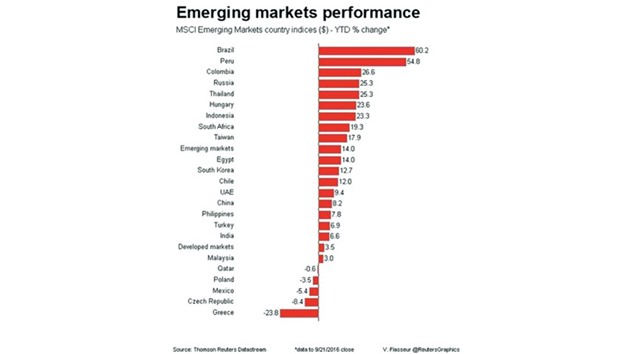A dovish US Federal Reserve message gave emerging markets renewed impetus yesterday, pushing the benchmark equity index to two-week highs while currencies firmed, led by the South African rand hitting one-month highs.
The Fed signalled a rate hike by year-end, but cut the number of increases expected in 2017-2018.
It also reduced its longer-run interest rate forecast to 2.9% from 3%, leaving investors confident the pace of policy tightening would be glacial at best.
As the dollar retreated, emerging assets jumped.
MSCI’s emerging equity index rose 1%, extending Wednesday’s 0.8% gain.
Currencies added to strong gains made against the greenback immediately after the Fed message, shaking off jitters from earlier in the week.
Asian currencies rose across the board versus the dollar. “Our view has been that both the BoJ (Bank of Japan meeting) and the Fed would be non-events and people would come back to buy,” said David Hauner head of EEMEA Cross-Asset Strategy & Economics at Bank of America Merrill Lynch. “Many clients have been receiving inflows, some of which were not invested because investors thought the rally had gone too far, too fast and had been waiting for a pullback to buy.” The South African rand, among the most sensitive to dollar moves, added 1% after rising 2.5% in the previous session and the rouble firmed slightly after strengthening 1.5%.
The rand is also basking in recent better-than-expected data on South Africa’s growth, current account and inflation, which has left investors confident the central bank will hold off raising interest rates.
Benchmark bond yields fell to one-month lows ahead of a central bank meeting yesterday. Meanwhile the Turkish lira rose 0.3% to two-week highs, but gains were limited by expectations the central bank would cut the upper limit of its interest rate corridor by 25 basis points (bps). Standard Chartered advised buying emerging currencies, singling out the lira which has lagged the rally because of a tourism slump and political concerns after a failed coup. “As political tensions ease we see a likely reversal of both, with the potential for significant catch-up in what are now underweight investor positions,” Standard Chartered said. “We think investors should look for opportunities to build long lira positions, both on an outright and relative value basis.” In central Europe, the zloty hit 7-week highs against the euro while the forint approached 6-1/2-month peaks and bourses in both countries rose around 0.7%.
Investors also awaited a central bank meeting in Egypt that is expected to raise interest rates by at least 50 bps and possibly signal the timing of a mooted currency devaluation.

